Your favorite restaurants and local supermarket are full of health-food impostors
By David Zinczenko
This is an election year, which means that if you hate being lied to, the next 11 months are not going to be pleasant.
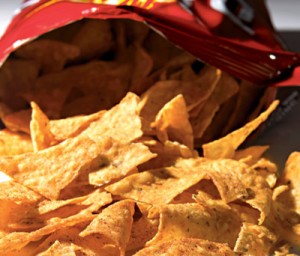 Your instinct might be to turn off the TV, cancel the paper, and unplug the Internet until November passes. And that will work, to a certain extent. But if you really want to avoid being lied to, I suggest you take an even more radical step.
Your instinct might be to turn off the TV, cancel the paper, and unplug the Internet until November passes. And that will work, to a certain extent. But if you really want to avoid being lied to, I suggest you take an even more radical step.
Stop going to the supermarket.
Unless you’re as easily misled as Newt Gingrich’s ex-wives, you’re already clued in to the idea that most political campaigns are nothing but a pile of baloney, sandwiched between two slices of toasted mendacity. But unless you have a Ph.D. in nutrition, you might not realize that the supermarket shelves are as full of shysterism as the campaign trail. Every time you walk into a grocery store or a restaurant, food marketers are trying to feed you a line of bull.
That’s why we launched the Eat This, Not That! book series four years ago. By playing David to Big Food’s Goliath, we keep the food industry honest. More than 6 million books later, the mindset of hungry Americans is clearly changing. Recent polls show 96% of us would like genetically modified foods to be clearly labeled, and 70% of U.S. diners want more transparency about the sourcing and nutritional value of their menu items.
But until those improvements come to pass, you’ll have to take your nutritional fate into your own hands. The shelves of your local supermarket and the pages of your favorite chain’s menu are rife with health food impostors, and it’s up to you—and me—to call them out.. Some of these shady products are so egregious, in fact, that I believe they deserve a swift smack from the heavy hand of the law. Below I throw the book at 7 foods that just aren’t what they seem.
Food Label Lie #7: Sunny D
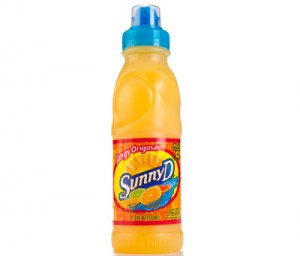 The Crime: The day-glo liquid presents itself as a delicious, nutritious alternative to orange juice, but in truth, it’s little more than sweetened water.
The Crime: The day-glo liquid presents itself as a delicious, nutritious alternative to orange juice, but in truth, it’s little more than sweetened water.
The Evidence: Look at the label. The vast majority of this bottle consists of water and corn syrup, with less than two percent coming from concentrated juice swirled with artificial colors, sweeteners, canola oil, and sodium hexametaphosphate (don’t ask). The beverage company bases its vague nutrition claims (“sunshine in a bottle”?) on the fact that Sunny D contains 100% of your vitamin C. But you know what else has 100% of your day’s vitamin C? A scoop of broccoli, a few thick slices of red bell pepper, a medium orange, or a multivitamin. Also condemnable is Sunny D’s current marketing campaign, which encourages children to collect Sunny D labels in exchange for schoolbooks. Care for some diabetes with that diploma?
The Takeaway: “Fruit-flavored” is no substitution for real fruit. If you want the full nutritional package, buy fresh, unadulterated produce—or at the very least 100 percent juice. Sunny D isn’t the only beverage that will drown your healthy diet.
Food Label Lie #6: Natural Cheetos
The Crime: Abuse of the term “natural.” Last I checked, Cheetos don’t grow in the wild.
T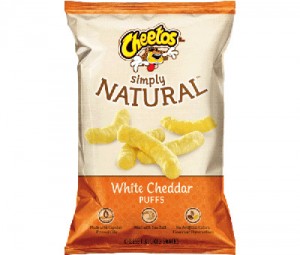 he Evidence: When was the last time you saw a flowering field of disodium phosphate? Or how about a fresh crop of maltodextrin? Didn’t think so. These cheese puffs consist largely of corn, but they’ve been processed to the point that no 20th-century farmer would ever recognize them as food. What’s more, compared to regular Cheetos, they only have about 10 fewer calories per serving. Oh, and see those “natural flavors” on the ingredient statement? By FDA standards, those don’t even have to relate to the food in question. For all we know, those are tinctures made from bovine bone marrow.
he Evidence: When was the last time you saw a flowering field of disodium phosphate? Or how about a fresh crop of maltodextrin? Didn’t think so. These cheese puffs consist largely of corn, but they’ve been processed to the point that no 20th-century farmer would ever recognize them as food. What’s more, compared to regular Cheetos, they only have about 10 fewer calories per serving. Oh, and see those “natural flavors” on the ingredient statement? By FDA standards, those don’t even have to relate to the food in question. For all we know, those are tinctures made from bovine bone marrow.
The Takeaway: Except in the instance of some meat products, the FDA doesn’t regulate use of the word “natural,” leaving the food industry free to define it on its own terms. In 2008, natural products reached $22 billion in sales, four times that of organic products. Defend yourself by reading the ingredient statement. If you can’t pronounce it, it probably ain’t natural.
Food Label Lie #5: Mott’s Medleys Fruit and Vegetable Juice
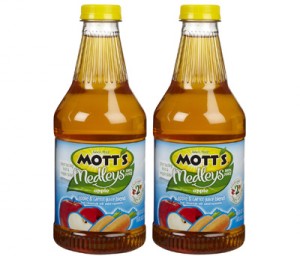 The Crime: Although wholesome by juice standards, this one is promoted to parents as a substitute for real fruits and vegetables. But fruits and vegetables have fiber; Mott’s has none.
The Crime: Although wholesome by juice standards, this one is promoted to parents as a substitute for real fruits and vegetables. But fruits and vegetables have fiber; Mott’s has none.
The Evidence: The Mott’s label says that each bottle contains two servings of fruits and vegetables, and sadly, the USDA agrees. The government’s MyPlate considers juice to be a suitable substitution for produce. But here’s why it’s not: One of the biggest health boons of fruits and vegetables is the fiber, which fills the stomach, slows digestion, and fights disease. According to a recent study from Archives of Internal Medicine, people who consume the most fiber have a 22% lower chance of premature death from any cause. Yet at the current rate of consumption, Americans are getting only about half the fiber they need. A single apple has more than four grams of fiber. That’s about four grams more than a bottle of Mott’s Apple Medleys.
The Takeaway: Modest amounts of juice can fit into a healthy diet, but it’s no substitution for whole produce.
Food Label Lie #4: Mission Garden Spinach Wraps
T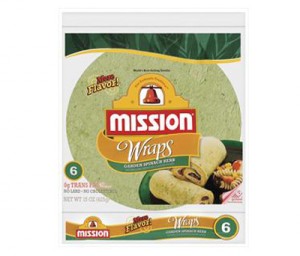 he Crime: Mission’s “Garden Spinach” wraps are guilty of identity theft—there’s no spinach to be found in these crooked tortillas!
he Crime: Mission’s “Garden Spinach” wraps are guilty of identity theft—there’s no spinach to be found in these crooked tortillas!
The Evidence: Along with a ton of unnatural, unhealthy ingredients like enriched flour, these spinach imposters contain less than 2 percent of “spinach powder” seasoning. Yum! And the wraps’ green color? Courtesy of food dyes yellow #5 and blue #1.
The Takeaway: Don’t judge a book by its cover—or a product by its package. The front label is little more than an advertisement for the company, so for legitimately useful information, look to the Nutrition Facts Panel and the ingredient statement. And remember: Just because a food is “flavored” like a whole food doesn’t mean it contains a whole food.
Food Label Lie #3: Doritos
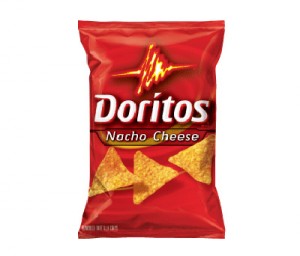 The Crime: On the front of the bag, Frito-Lay reassures us that Doritos contain “0 grams trans fat.” Problem is, it’s a blatant lie!
The Crime: On the front of the bag, Frito-Lay reassures us that Doritos contain “0 grams trans fat.” Problem is, it’s a blatant lie!
The Evidence: Partially hydrogenated oil is the primary source of trans fat, and these cheesy chips contain two types: partially hydrogenated soybean oil and partially hydrogenated cottonseed oil. So how does the company get away with the “0 grams” claim, you ask? The FDA allows manufacturers to market products as trans-fat free if they contain less than 0.5 grams of the artery-clogging acids per serving. But get this: The American Heart Association recommends we max out our trans fat intake at about 2 grams per day, so if you’re regularly eating foods with 0.49 grams per serving, then you can easily surpass that limit without knowing. That could lead to a host of cardiovascular problems, and one recent Spanish study even linked increased trans fat consumption with a lower quality of life and overall happiness.
The Takeaway: At the risk of belaboring the point: Read the ingredient statement. If you see anything that’s been “partially hydrogenated,” you have a trans-fatty food in your hand. Set it down and nobody will get hurt—least of all you.
Food Label Lie #2: Chili’s Guiltless Grill Classic Sirloin
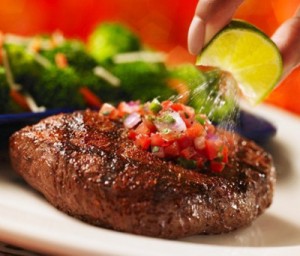 The Crime: This “Guiltless” entrée is, well, guilty—of containing a shameful amount of salt.
The Crime: This “Guiltless” entrée is, well, guilty—of containing a shameful amount of salt.
The Evidence: Chili’s loads this sirloin with 3,680 milligrams of blood-pressure-spiking sodium, far exceeding the USDA’s recommended daily limit of 2,300 milligrams (for some people, like those at risk for hypertension, it’s only 1,500 milligrams!). And the Chili’s marketing team has the nerve to put this on the restaurant’s “Guiltless Grill” menu? Guffaw! Sadly, Chili’s isn’t the only guilty restaurant when it comes to the sins of salt. Chains like Applebee’s and Cheesecake Factory, for example, also pack egregious amounts of sodium into specialty items geared toward health-conscious eaters.
The Takeaway: In terms of calories, diet or “light” options are usually superior to other items on a chain’s menu, but almost all major chain restaurants still take a heavy-handed approach to the salt shaker. If you’re going to eat out, make an effort to keep your sodium intake as low as possible for the rest of the day.
Food Label Lie #1: Wendy’s Natural-Cut Fries
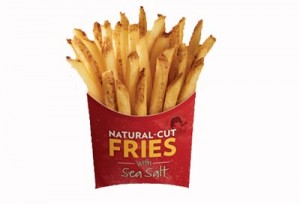 The Crime: Wendy’s promotes these spuds as a healthy alternative to typical fries—the chain’s website boasts that they’re “naturally-cut from whole Russet potatoes” and seasoned with “a sprinkle of sea salt.” But there’s more to it than that.
The Crime: Wendy’s promotes these spuds as a healthy alternative to typical fries—the chain’s website boasts that they’re “naturally-cut from whole Russet potatoes” and seasoned with “a sprinkle of sea salt.” But there’s more to it than that.
The Evidence: A quick skim through Wendy’s ingredient statement is all it takes to expose these fraudulent spuds. They contain preservatives, added sugars, and hydrogenated oil. Last I checked, there was nothing remotely natural about infusing vegetable oil with hydrogen. Technically, Wendy’s isn’t lying that these fries are “natural-cut.” But it makes one wonder: What would be the unnatural way cut a potato?
The Takeaway: Restaurants toss out buzzwords like “natural,” “fresh,” and “wholesome” as a clever way of making not-so-nutritious items seem closer to what you’d make at home. Truth is, food manufacturers haven’t found a way to align your health with their profits, and until they do, the onus of healthy eating is on you and you alone.
Original Article: http://fitbie.msn.com/slideshow/7-biggest-food-label-lies